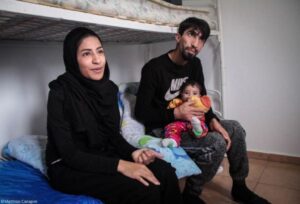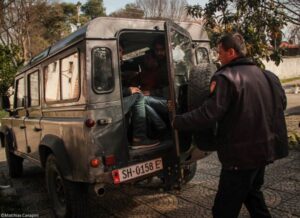Text and photos by Matthias Canapini* – Unimondo**
This eighth episode is set in Albania (read previous episodes here: first, second, third, fourth, fifth, sixth, seventh, eighth)
In April 2019, following the main migrant and refugee routes along Europe’s borders, I spent about ten days intermittently in Albania. I share with you an excerpt of this choral story, collected between mountain passes and “border” countries.

We are warmed by the kind eyes of Yeda, 24, who sits on the edge of her bed and massages her aching feet. The shelter provided by Catholic Charity Caritas is modest but comfortable: a bunk bed, a small stove, a small table on which there are yoghurt packets, three apples, the baby bottle of Jood (six months old), who, together with his father Mohamed, makes up the rest of the small family. “We lived in the Yarmouk refugee camp, a district of Damascus populated by Palestinians. I studied art history and was happy with my life, despite the bombs and cold food. I could even have stayed in Syria because my family supported Bashar al-Assad politically. I would not have had too many problems, but in 2014 I decided to leave to be reunited with my husband. Mohamed was a policeman. One day he was ordered to quell a riot and shoot his people…. He refused and fled to Turkey as a deserter. He had already risked his life in 2012. As he slept, a bomb hit the apartment he was in, killing three of his friends and seriously injuring him. Mohamed burned like a torch. Thankfully, some passers-by saved him by throwing a blanket over him to smother the flames. At the hospital, in addition to surgery, they inserted titanium plates in his chest and right arm.”

The young man’s skin, unbuttoned at Yeda’s request, looks wrinkled like sheep’s skin heated over embers. From the armpits to the ears, the epidermis bears the black scars of fire, the buds of burst capillaries. As we speak, I remember that Yarmouk almost no longer exists: of the one hundred and eighty thousand inhabitants who lived in the narrow streets of the camp, a symbol of the Palestinian diaspora and for decades stronghold of the resistance movement, only six thousand remain. “The horrors of war were compounded by the violence of Daesh. There was a lack of food, drinking water and medicine. The corpses, bloated like balloons, were carriers of infection and disease. I lost my daughter to malnutrition – she was nine months old. In Idlib, mortar shells fell day and night. On Tuesday I crossed the Turkish-Syrian border illegally, and a car bomb killed thirteen people, including three children. We lived in Turkey for four years, saving money for the journey. I became pregnant while we were making detailed plans to leave for the Greek islands.”
The rubber dinghy in which the couple were travelling capsized like a nutshell on the third collision with the raging waves, scattering fifty-four people into the sea. They immediately discovered that the life jackets were fake, stuffed with sponge and waste paper. “We had paid up to 1,200 euros instead of 600 euros for these life jackets, trusting the trafficker who promised to sell only high-quality products. We paid more simply because we were afraid of dying, but the stretch of sea was short and the coastguard rescued us. Our son Jood was born in the field hospital on the island of Chios. After the birth, we took a ferry to Athens and from there directly to Albania. The day before yesterday it took us fifteen hours to reach the Albanian border, instead of an hour. We got lost in the mountains and the GPS didn’t help. Now we take a deep breath and think about the future. I feed my son with powdered milk, but I feel he is weak. He needs vitamin D, vaccines, and restoratives. Every time I look at him, I wonder what kind of future we can give him in Europe.”

Aida (Caritas worker) cries quietly as she looks at the smoking chimneys outside her window. It is not easy for a sensitive person to listen to such a story and to come to the bitter realisation that there is nothing you can do to change the way things are. Near Gjirokastër (in Greek, the Fortress of Silver), a busload of profanity drives through a valley wedged between the Mali Mountains, the Gjerë and the Drino River. There is a 14-year-old innkeeper, Clay, who chatters like an adult. There is dry bread, leftover coffee and Sister Severina, 85 years old, on her last mission before retirement. There is the fusion of Greek, Roman, Byzantine, Turkish and Albanian art, and the return of the past, with the remains of the Tepelene concentration camp. “It was better to die than to go there. Mostly the wives and children of men the regime did not like ended up there. The camp was active from 1949 to 1954, but that was enough to make it one of the most notorious sites of the communist regime. I met many survivors, including a woman who worked, worked and was given a glass of salt water at the end of the day. This woman had a baby, but as it was forbidden to have relations in the camp and it was impossible to raise a child there, it was buried underground (for a while), dug up and smuggled out of the camp in a bag of pig bones,” Eva says, scratching the relief of a swastika with the nail of her index finger.

A prayer is choked in her throat and a centimetre of bestial rakj blesses her uvula. We return to the present thanks to an energetic pat from Matilde, an outspoken, polyglot woman in the ranks of the local Caritas: “With the arrival of summer tourism, Greece is opening the gates to get rid of the refugees temporarily, herding them into camps on the mainland. The world’s tourists on holiday in Chios and Lesbos will be able to sleep soundly until the end of September, thanks to a policy that conceals reality. The classic theatre of dust being swept under the carpet. There is talk of forty thousand people on the Macedonian border alone, stranded there with no orientation or support. People were tired, suffering, and tense, trying to break through the walls of Europe. We hear so many stories every day: prostitution, organ trafficking, mafia fights, crime; all unknown sub-worlds of continuous migration. Albania is pushing for the registration of all people in transit, while Greece is doing nothing, or rather: it is doing the same as Turkey. If, for example, a third country receives funds to manage ten thousand people, but only half of them are housed in the camp that has been set up, where does the rest of the money go, and to whom? European funds are often a front to hide a gigantic business where human life is worth as much as a slipper. In Kakavia there was an old building from the communist era. Caritas Tirana renovated and whitewashed it, providing beds, washing machines and nursing equipment. It is a cramped, perhaps run-down, but strategic place. If we weren’t there to monitor the daily passages, someone might be sent back, and who would ever know? Be there despite everything and hope for common sense.”
Even the 20-inch TV on the ferry leaving Durres broadcasts the voices of the travellers: fifteen Iraqis arrested in Kakavia; twelve Pakistanis caught in a Slovenian truck; and four Afghans hunted down in Niksic. Can it be a crime to pursue tomorrow’s aspirations? A crime to be born in the cursed part of the world?
* Matthias Canapini was born in Fano, central Italy, in 1992. He travels at a slow pace to tell stories with his notebook and camera. He has published five books since 2015 and is currently a news editor and reporter for the news outlet Unimondo
** Unimondo, founded on 10 December 1998 under the auspices of the Fontana Onlus Foundation, is an online news outlet dedicated to providing authoritative content on peace, sustainable human development, human rights and environmental issues. It offers diverse and timely information, amplifying the voices of different facets of Italian and global civil society. As the Italian hub of the OneWorld network, founded in London in 1995, it is part of a global network with 11 centres worldwide and 1,600 partner associations

























